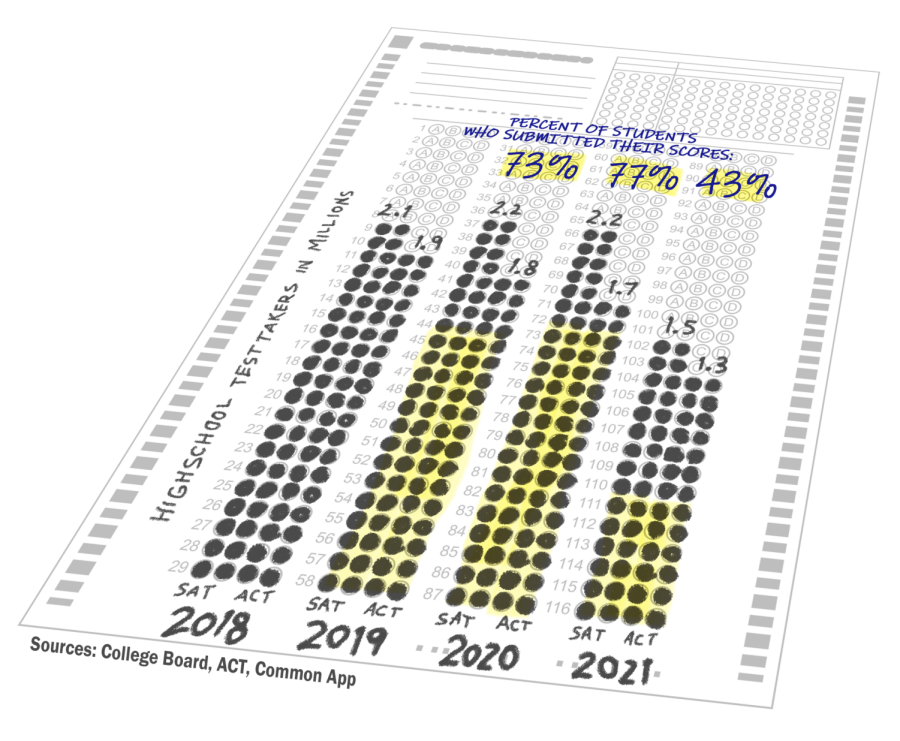When college application time arrives, seniors sweat over test scores and strive to present themselves in the best light they possibly can to college admissions. When the COVID-19 pandemic hit, one of those stressors became even more complicated.
“For this year and last year especially, it’s been a little weirder with test-optional,” senior Shraddha Bhatia said.
The worldwide outbreak of COVID-19 canceled standardized testing throughout America, which pushed along a movement that was a long time coming. Although the pandemic caused colleges to go test-optional, the debate on the utility of standardized testing well precedes the pandemic.
In 1969, Bowdoin College was the first to make standardized testing scores (SAT/ACT) optional but was not widely adopted. Later on, in 2001 the University of California conducted studies that showed SAT and ACT scores were not an accurate indicator of how well a student would perform in college. The respected college system made the switch to test-optional, causing many more universities to follow.
According to Common App, 77% of students submitted standardized testing scores in 2020. The numbers fell to 43% one year later, as the test-optional movement gained traction.
For the past two years, COVID-19 has disrupted schools and standardized testing across the world. Testing sites were closed, so many students had to forego their testing.
“We’re finding each school’s handling it in a different way,” Grover said.
The coronavirus isn’t the only reason why schools are going test-optional. Hundreds of colleges have gone test-optional with the purpose of creating an even playing field for students across the country.
“There is clearly an advantage in the SAT if you can pay for tutors,” senior Kaley Frye said. “Can you pay for practice books? Can you pay for all of this? Can you pay to take it 5 million times?”
Since 2013, average ACT scores for students with a family income of $80,000 or more increased every year and is currently at 23.6 (out of 36 possible points). Since 2013, the scores for students with a family income of lower than $80,000 decreased every year and is currently at 19.5. Many argue that this significant change further closes the gap of economic disparity between students and encourages equal opportunity.
Two seniors, Frye and Anjali Daniel were both accepted into Emory University though Frye submitted her SAT and ACT scores, but Daniel did not. Emory University went test-optional in 2020 and has continued to stay test-optional until at least the fall 2022 cycle.
“If it’s not up to par with what the school wants, then you’re suggested not to [submit],” Daniel said.
Not all colleges agreed with the sudden change to allow students the option to submit tests. After going test-optional due to COVID-19, well-renowned college MIT has reinstated mandatory testing for applicants starting with the class of 2023. This reversal of test-optional at MIT may be an indicator of more colleges to follow in years to come, though college counselor Christine Grover is not so convinced.
“There’s some [colleges] questioning if MIT’s research is long enough,” Grover said.
MIT reinstituted mandatory testing after they initiated a 4-year study tracking the difference in GPA between students that submitted and students who didn’t throughout their college tenure. MIT announced, but has yet to publicize the details of their findings. MIT said it returned to a test-based admissions process because of the highly technical nature of their curriculum. Colleges are given selectivity to ask for submissions or not considering their individual academic focus.
“There’s that chicken or the egg debate going on with the colleges,” Grover said.
713 schools made test score submissions optional in 2019, which nearly doubled to 1,350 schools in 2020. This was a major move for the 1 million students who routinely report them each year.
Furthermore, the College Board’s recent announcement to digitize the SAT and ACT starting in 2024 may indicate the beginning of the end of standardized testing, which has been aggressively pushed by colleges as of late. Relieving students across the country, this new trend will cause students to focus more on other aspects of their application.
“I think that kids will less focus on taking the test itself, and [be] more focused on the extracurriculars and everything else,” Daniel said.
















Joan Zaslow • May 14, 2022 at 2:17 pm
A very informative and thought provoking article on a subject that has caused consternation for decades.